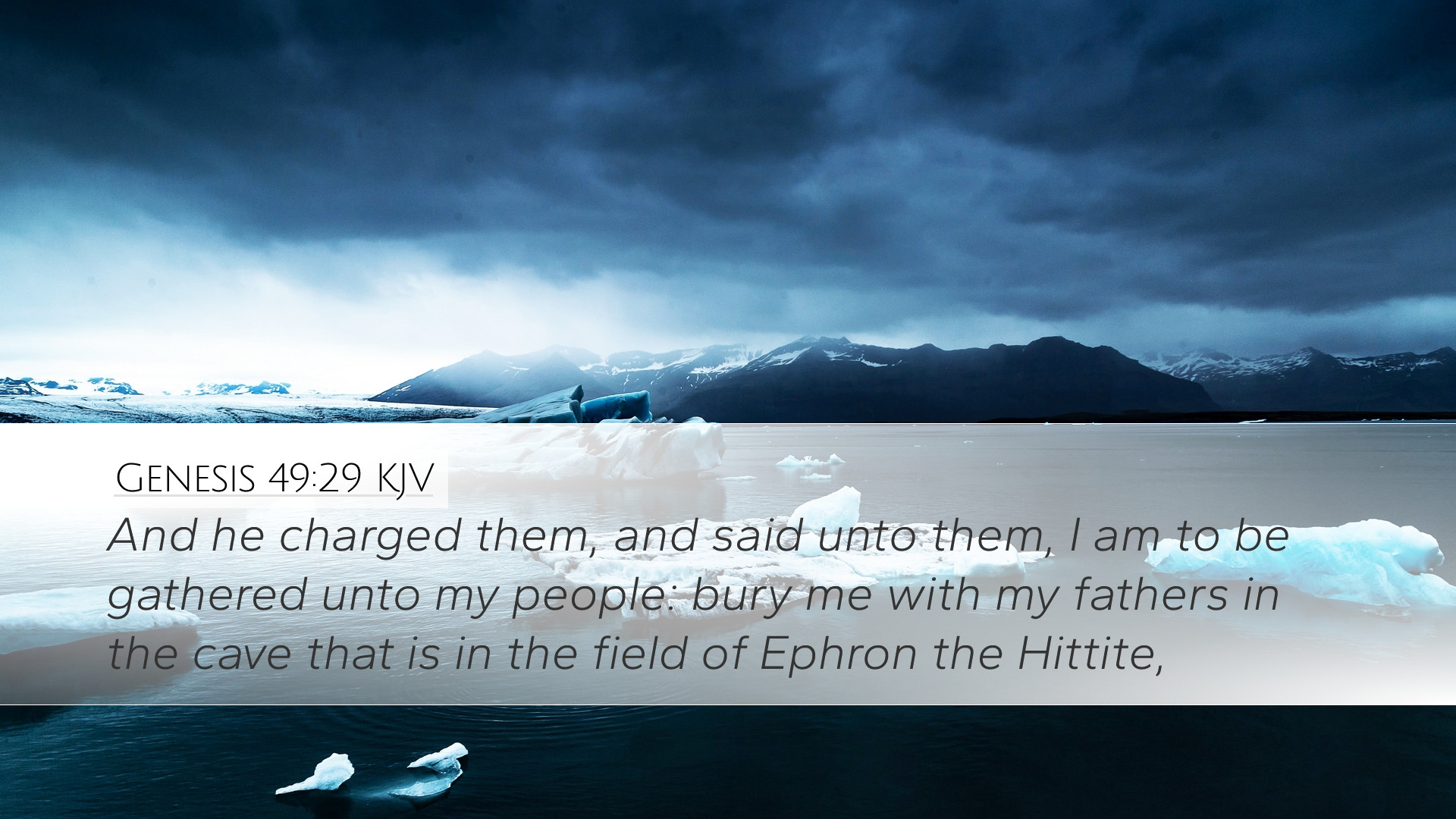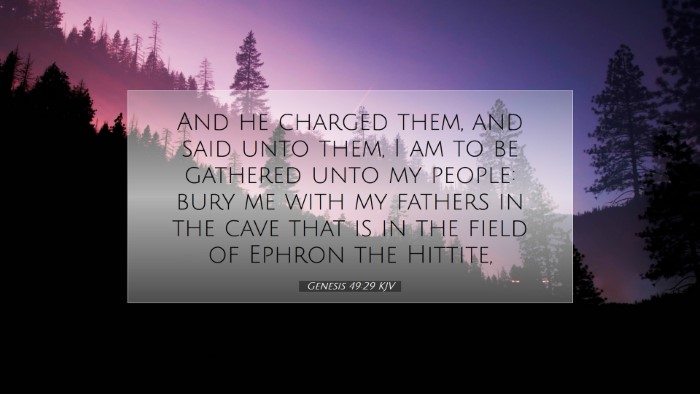Commentary on Genesis 49:29
Genesis 49:29 reads: "Then he charged them, and said unto them, I am to be gathered unto my people: bury me with my fathers in the cave that is in the field of Ephron the Hittite." This verse concludes the blessing Jacob bestows upon his sons, and it is rich with theological significance and historical context.
1. Contextual Analysis
The context of this verse is important. Jacob, now an old man, is near the end of his life. He has called his sons to bless them and prophesy about their future. This specific charge regarding his burial reflects his deep attachment to his ancestry and the land promised to Abraham, Isaac, and Jacob himself.
1.1. The Importance of Burial
In the ancient Near Eastern culture, burial practices were significant. Opting to be buried in a family grave symbolizes not just physical rest but a connection to one's lineage. Jacob's words echo the promises made to his grandfather Abraham and father Isaac about the land of Canaan.
2. Jacob's Request to be Gathered to His People
Jacob's statement, "I am to be gathered unto my people," indicates his belief in a collective identity beyond death. This is understood in multiple ways:
-
2.1. Familial Connection:
It shows that he desires to be reunited with his ancestors, indicating a belief in the continuity of his lineage.
-
2.2. Faith in the Afterlife:
It may also allude to the understanding of life after death, suggesting a hope of being with his people in a divine context.
3. The Cave of Machpelah
Jacob's specific mention of the cave of Machpelah is noteworthy as it reflects the importance of this burial site. It was the first piece of land Abraham purchased and will later become a family tomb for the patriarchs. This act symbolizes God's promises to Abraham about the land being given to his descendants.
3.1. Historical Significance
The site later becomes a symbol of hope and a point of rest for the Jewish people, connecting them to their heritage and the divine promise. The importance of preserving this location reverberates throughout the subsequent biblical narrative.
3.2. Theological Implications
Jacob's request implies a recognition of God's promises concerning land and posterity. It reflects a profound understanding of God's covenant with Abraham and the continuity of His plan through the generations.
4. Insights from Commentators
Various public domain commentaries provide rich insights into the verse:
4.1. Matthew Henry
Matthew Henry emphasizes the patriarchal significance of Jacob's request. He observes that Jacob wants to conclude his earthly pilgrimage by returning to the place where his forefathers rest. This act signifies an acknowledgment of God's covenant with his family.
4.2. Albert Barnes
Albert Barnes points out that the phrase "gathered unto my people" reflects Jacob's understanding that he belongs to a larger narrative and community. He highlights that this death is not merely an end but a continuation of God's promise to Israel.
4.3. Adam Clarke
Adam Clarke gives particular attention to the emotional weight of Jacob’s words. He discusses the importance of death and burial in the Jewish traditions, emphasizing the connection it creates within the family structure and communal faith.
5. Application for Pastors and Theologians
The insights from Genesis 49:29 can be profoundly impactful for pastors and theologians in multiple areas:
-
5.1. Ministering to Grieving Families:
Understanding the significance of burial can help guide church leaders in providing comfort and context for grieving families, illustrating the hope of being with loved ones in eternity.
-
5.2. Covenant Theology:
This passage serves as a crucial reference in discussions about covenant theology, highlighting God’s unbroken promises and their historical context throughout scripture.
-
5.3. Emphasizing Identity in Christ:
The notion of being "gathered to my people" parallels the Christian understanding of unity in Christ as part of the body of believers, encouraging discussions on community and eternal life.
6. Conclusion
Genesis 49:29 encapsulates the faith, tradition, and expectations surrounding death and burial in the biblical narrative. It reflects Jacob's deep sense of identity tied to his lineage and God's promise, emphasizing the importance of burial in the context of family history and covenantal blessings. As scholars, students, and theologians alike reflect upon this profound moment, the passage serves as a reminder of the collective identity and heritage found in faith.


